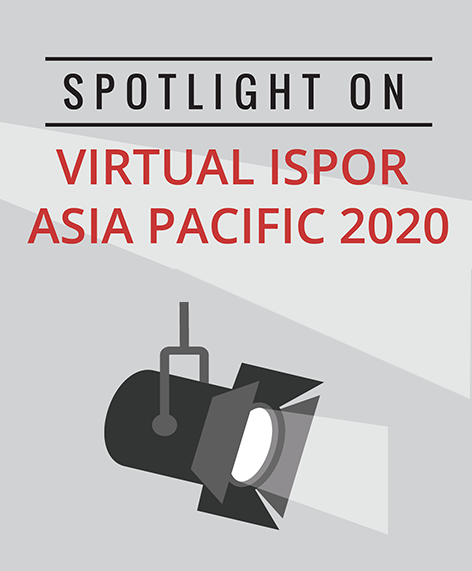Managing COVID-19 in the Asia Pacific Region: Reflections and Future Priorities
Martin Vu, MPH, BSc and Koen Degeling, PhD, MSc, BSc, Cancer Health Services Research, The University of Melbourne, Melbourne, Australia
The responses of China, South Korea, Japan, and Singapore to COVID-19 outbreaks have resulted in low numbers of reported cases and excess mortality compared to other countries in the Asia Pacific region and worldwide. This first plenary session of the Virtual ISPOR Asia Pacific 2020 conference reflected on differences in approaches taken and the challenges faced at the time of the initial responses. The panelists discussed approaches toward the “new COVID normal” and how the field of health economics and outcomes research (HEOR) can contribute. [Figure 1]
Figure 1. Plenary Session Speakers
A lack of knowledge on the disease was the main challenge during the time of the countries’ initial responses. The session moderator, Shawn Vasoo, MBBS, MRCP, National Centre for Infectious Diseases, Tan Tock Seng Hospital, Singapore, Singapore, specifically highlighted a lack of information on how the disease spreads, requiring Singapore to base its initial response on their experience in managing the previous SARS outbreak. Limited testing capacity during the beginning of the outbreak in China, as well as large population movements due to the Chinese New Year, were key challenges noted by Fan Wu, MD, PhD, Shanghai Medical College of Fudan University, Shanghai, China.
“The pessimist complains about the wind. The optimist expects it to change. The leader adjusts the sails.”
—Slide from keynote address by Kwang Hyub Han, National Evidence-Based Healthcare Collaborating Agency, Seoul, Republic of South Korea
Preventing the Next Wave
Ownership of these challenges in dealing with the COVID-19 pandemic across these countries was evident from the structured approaches outlined by the speakers. Dr Vasoo discussed how Singapore successfully managed the first wave of cases and prevented a second wave utilizing healthcare resources and infrastructure that were established after the SARS outbreak in 2003. Dr Wu reflected on how China managed to prevent a second wave through coordinated national and targeted regional responses.
Both South Korea and Japan experienced a second wave of COVID-19. Whereas most cases during the first wave in South Korea affected the 20-29-year age group, the second wave was associated with more cases in the elderly, posing a substantially higher health risk. Wang-jun Lee, MD, PhD, Myongii Hospital, Seoul, Republic of South Korea presented South Korea’s 4 key strategies to manage the outbreaks: (1) transparency and openness, (2) containment and mitigation, (3) triage and treatment, and (4) mass screening and fast tracking. The final panelist, Kenji Shibuya, MD, DrPH, King’s College, London, United Kingdom, indicated that Japan was able to inform its policies based on experiences in China and South Korea, adopting a strategy focused on cluster control and avoiding close crowded spaces and close contacts. Dr Wu considered the impact of differences in social governance, as well as cultural differences, in mobilizing the general public to adhere to control strategies.
In controlling community transmission of COVID-19, the panel agreed that strategies should be based on a combination of testing and restriction measures, such as lockdowns. Despite their effectiveness, Dr Wu emphasized that governments should carefully consider when to use lockdowns because of their strong negative impact on the economy. “I think lockdown is too costly and should be used very carefully,” said Dr Wu. Furthermore, Dr Vasoo highlighted the importance of good tests, because false positive test results also pose a substantial economic burden to society. Dr Shibuya raised concerns regarding the rollout of a potential vaccine, as research found that the Japanese population has little confidence in the importance and effectiveness of vaccines. Dr Shibuya also reflected on evidence that shows a lack of correlation between lower mortality and higher economic decline.
Forging a Way Forward
South Korea has defined a clear roadmap to achieve the “new COVID normal” without relying on a vaccine in the near future. Dr Lee presented the dual-track healthcare system, in which care for COVID and non-COVID patients is provided in hospitals concurrently. This system is based on the principles of compartmentalization of space and manpower, use of buffer zones and secure protected areas, competent in-house testing, and real-time communication technology. [Figure 2]
Figure 2. Myongji Hospital Building E
Underpinning achieved successes in the COVID-19 pandemic response and the need to develop a future sustainable healthcare system, the panel discussed the potential of organizations like ISPOR to promote and facilitate exchange of knowledge and experience in the global HEOR and health technology assessment community. This will be essential to provide policy makers with guidance on how to evaluate the value of new technologies, including vaccines, and how to deal with the ongoing impact of COVID-19.



